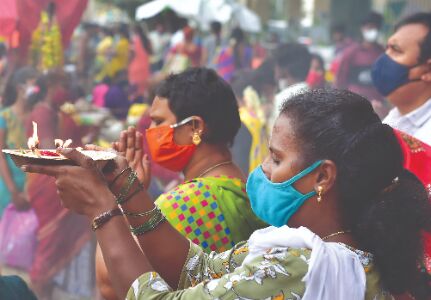Covid: Next 100-125 days are critical for both system and people, says govt

New Delhi: The government on Friday said the recent slow decline in number of daily cases is a warning and though the situation is currently under control, it can deteriorate if Covid appropriate behaviour is not followed, and noted that the next 100-125 days are critical, both for the system and people.
Addressing a press conference, NITI Aayog Member (Health) Dr V K Paul said the question of the third wave keeps coming up because the population is still "very vulnerable" to the infection.
"We still have not reached the stage of herd immunity... we don't want to acquire herd immunity through infections. We are progressing in terms of vaccines and nearly 50 per cent of our most vulnerable group, above the age of 45 years, is protected. This will also impact mortality and it will come down, but there can be spread of infection. We are vulnerable. Virus is still around," he warned.
Paul said the next 100-125 days are critical.
"We need to be cautious...we have seen that our decline has slowed down and this is a warning to us but the situation is under control. This can worsen. But it is not in our hands to not let it worsen. These are the same tools (COVID-appropriate behaviour) that are being talked about. If we use them, then the third wave may not hit," he said.
"If we all decide then there won't be any third wave. As vaccination drives pick up further...(in) three, four months, then there is a possibility that we will be in a safe zone. But the next 100-125 days are critical, both for the system and people. We have to remain cautious," he added.
Giving rise to fresh worries about the COVID-19 pandemic rearing its head again, the R-factor, which indicates the speed at which the infection is spreading in the country, has risen recently leading to a sluggish pace in the decline of active cases, while Kerala and northeast states have emerged as regions of concern, an analysis by researchers at the Institute of Mathematical Sciences in Chennai.
Joint Secretary at the Health Ministry Lav Agarwal said though the number of cases of COVID-19 have come down there are still some concerns.
"There are 47 districts in the country across 12 states and UTs where the positivity rate is more than 10 per cent. The states and UTs were Manipur, Kerala, Rajasthan, Meghalaya, Mizoram, Arunachal Pradesh, Nagaland, Sikkim, Tripura, Assam, Maharashtra and Puducherry," he said.
He further said that 73 districts are reporting more than 100 daily cases.
"The COVID-19 pandemic is still amidst us and even in limited geography but we are still battling the second wave," he said
Agarwal presented a study in which decline in mask usage can be seen.
"With the resumption of activities, decline in mask usage is being seen. We need to incorporate masks as the new normal in our lives," he said. He also said community mobility data shows that there has been a rise in mobility in the country in comparison to May 20 when most of the country was under lockdown.
"It is important that as we are returning towards relaxation we must keep in mind the precautions that we have to take like the use of masks, maintaining two-feet distance and hand hygiene," he said.
Earlier on Thursday, AIIMS Director Randeep Guleria said that waning immunity, the emergence of a more transmissible coronavirus variant capable of escaping the immunity shield and lockdown relaxations can be the likely causes of a possible third wave of COVID-19, Thursday.
Speaking at an event, he said the third wave can be mitigated by following Covid-appropriate behaviour such as maintaining social distancing, using masks, and taking vaccine. He said several studies and modelling have been conducted to project the trajectory of a possible third wave of the pandemic under different scenarios.
"One such model from an IIT shows that if all restrictions are lifted and if a virus (variant) is also able to escape immunity then the next wave can be bigger than the second wave.
"If some restrictions are kept and the virus also remains stable then cases will not be much and if we keep more restrictions then cases will further reduce," he said.
Guleria said even if new variants emerge, the available vaccines can be tweaked.
Guleria said the third wave of COVID-19 is being seen in other countries but hospitalisation has come down, indicating that the vaccines are working.



